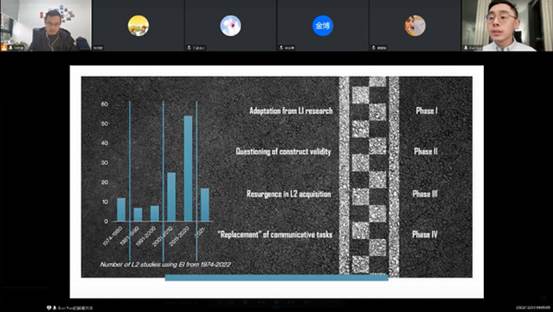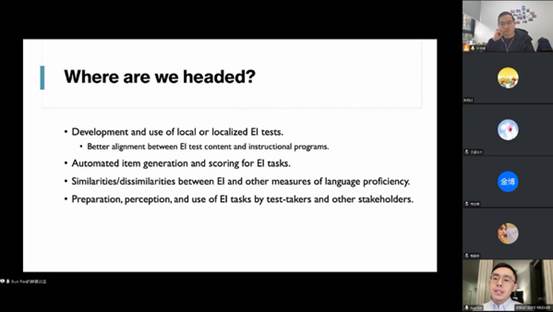On the morning of December 30, the 24th Zijin Lectures of the School of International Studies of Zhejiang University was held online at Tencent Conference as scheduled. A lecture entitled “Putting elicited imitation to the test: What have we learned and where are we headed?” was delivered by Mr. YAN Xun, an associate professor and doctoral supervisor at UIUC. The lecture was moderated by Mr. SUN Peijian, a researcher at the Institute of Linguistics and Applied Linguistics in Foreign Languages and a fellow of the “Hundred Talents Program”.
The lecture began with an introduction to the definition and common domains of elicited imitation (EI), a speaking task in language testing in which subjects are required to repeat word-for-word the sentences they hear. Research on EI has gone through four major phases, i.e., monolingual research, validity research, second language acquisition, and the “replacement” of communicative tasks.

Prof. YAN introducing the four phases of EI research
Prof. YAN then introduced some vital research findings at the four phases and revealed the essence of EI as a language proficiency measurement method. He discussed the impact of EI in other areas of applied linguistics before he raised three main questions to be addressed, namely 1) the process of discourse output in EI tasks, 2) the nature of the language produced in EI tasks, and 3) how the information obtained from EI tasks can contribute to teaching and learning activities. To illustrate the potential of this assessment method, he presented some of his team’s recent studies, such as “A corpus-driven course-based Chinese EI test”, “Testing participants’ strategy use in EI tasks”, and “Exploring fluency features in EI tasks”.
As to the prospects of EI research, Prof. YAN shared some forward-looking views about the development of localized EI tests, automated scoring of EI tests, similarities and differences between EI and other language proficiency assessment methods, and the preparation, perception, and use of EI tasks by EI participants.

Prof. YAN sharing his views on the future of EI research
He also offered some personal views on the use of psycholinguistic and communicative tasks in applied linguistics to measure language proficiency. Through the review of the different phases of EI research and the presentation of empirical studies, the audience was able to gain insight into the “resilience” of EI as a second language proficiency measure. Although there still remain some controversial issues about EI, advances in cognitive psychology and technology have expanded the scope of research on this assessment method and reshaped the focus of EI research.
At the end of the lecture, Prof. YAN answered the questions of the teachers and students in an enthusiastic and comprehensive manner. The clear logic, rigorous and pragmatic academic attitude, and visionary research perspective that he demonstrated during the lecture were very beneficial and enlightening. Though the lecture ended, the research implications will attract more scholars to investigate and practice.
Photo/Text: REN Zeqi
Institute of Linguistics and Applied Linguistics in Foreign Languages
December 31, 2022
Translated by ZHOU Dandan
Proofread by XU Xueying



